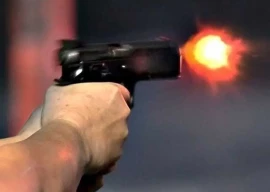
She comes over to our house once in six months and we never visit since she lives in ‘that’ part of town. But since it was Sunday and they’re both over 80, my father told me to be good and take Dadi to catch up with her phophizad behen.
We set out after lunch. Liaquat, our khansama and jack of all trades, had it all mapped out. We were to drive through Saddar, Lalukhet, Qayyumabad, Godhra and Ancholi. I was prepared for two hours of boredom. The car cruised by Makro, the Karachi Goan Association, the Parsi temple and Empress Market, and soon we were in Lalukhet’s main bazaar. Everyone was out shopping – buying their weekly groceries, bedding and lawn suits to survive the summer while little children were busy slurping Rooh Afza and leemun-pani (homemade lemonade).
We kept going straight, didn’t turn left or right – the sign-boards indicated that if we went any further we’d be in Sohrab Goth or heading towards Hyderabad. I asked Liaquat if we were going the right way, he insisted that he knew what he was doing. I put my faith in him and stared out the window. Everywhere I looked a poster with Muttahida Qaumi Movement chief Altaf Hussain’s smiling face welcomed me to different sectors and units. While driving through Godhra, I got excited. There were old mechanics, wholesale stores, furniture warehouses, Chinese dentists, Kareena Kapoor’s face on the poster for a panaflex store, an advertisement by Maqbool Dawakhana with an overweight man saying goodbye to his fat.
Then we got to Water Pump. A man wearing red trousers and a white wife-beater stood at the corner of a street selling gurr – a raw form of sugar referred to as jaggery. As Dadi’s mouth started to water, she asked Liaquat to stop and get out of the car. Next to the gurrwallah was a lane filled with lush green betel leaves, khushboo (scent), tobacco, elaichi (cardamom) and sanf (fennel). When the shopkeepers spoke it was as if their lower lip wanted to prevent the words from spilling out. Occasionally one would spit into a small golden spittoon. Saeed, who has been selling paan at a shack in the area, said that the freshest leaves in the city could be found here.
Next to paan gali was a lane filled with almonds, figs, mewa (dried fruit), barfi (condensed milk mithai), dry coconut and chickpeas. Dadi bought as much as she could in Rs250, so much that it was probably enough to last her a month. The channa, we were told was roasted three times a day and sold fresh. Most of the big stores in the city buy it in bulk from this neighbourhood and resell it for three times the price.
We were heading back when we saw a man selling ingredients to make your own herbal medicine. He had Amal Tas, tumba, dried lemons, marigold and roses. Amal Tas looked like long vanilla sticks and helps cure colds in children. The tumba, an ugly yellow ball of a dried up fruit, is supposed to cure diabetes.
As Dadi sniffed, inspected, bargained and bought a week’s supply, I had a feeling we might be visiting Durdana again next week.
Published in The Express Tribune, May 7th, 2012.
COMMENTS (5)
Comments are moderated and generally will be posted if they are on-topic and not abusive.
For more information, please see our Comments FAQ
1731570357-0/elon-musk-(1)1731570357-0-405x300.webp)
-(1)1717678110-0/Kendrick-(1)-(1)1717678110-0-165x106.webp)















@Author
I thought you would be making a point about the flies parked on the sweets. My stomach is still turning. Yeaks!
Thanx for the interesting article. The comments I am sure belong to the generation who may not have seen such places or have even heard of these items.
yawn What was that really for?
one senseless and bored article.....
Pointless!